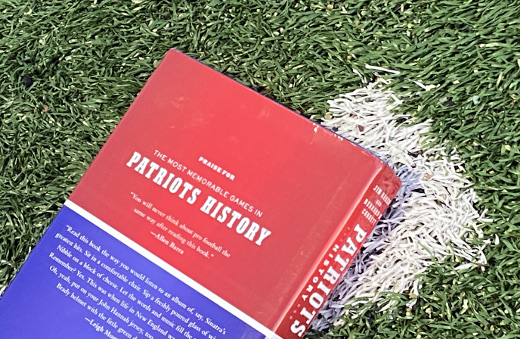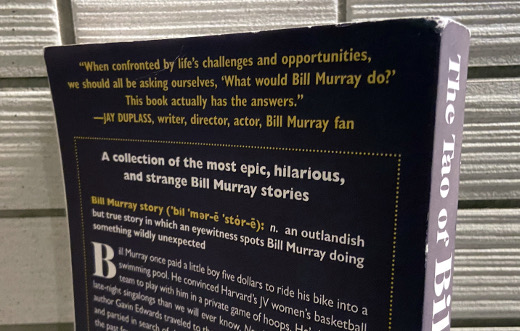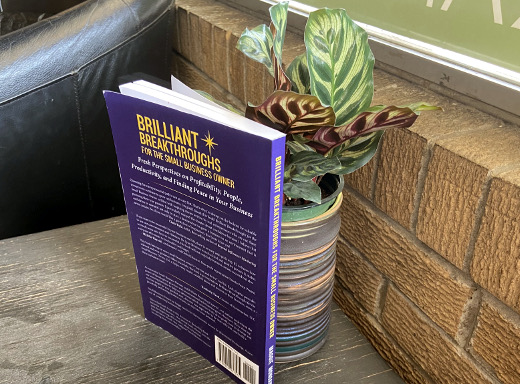My Takeaways From The Most Memorable Games in Patriots History

In a time of non-stop 24/7 sports coverage it’s hard to imagine this has not always been the case. I have to go back to my childhood to recall this, before getting cable TV and that little cable channel created by a former local sportscaster from my area called the Entertainment Sports Programming network, or ESPN for short. Prior to the late 70’s you literally had to be there to see the finer details of a game beyond the radio broadcasts and occasional local TV coverage.
This is why books like The Most Memorable Games in Patriots History are not only important but highly nostalgic. The core of the book is literally play-by-play of 10 games over the history of the New England Patriots football team. The narrative is by the authors Jim Baker and Bernie Corbett, heavily complimented with interviews and short pieces from many of the players and people at these games. It is a very detailed story of a sports team that almost wasn’t, and one nobody thought would be the global sports dynasty it is today.
As this Patriots fan read the jam-packed pages of this book, these are some of the many takeaways I had.
Unknown Facts – As the team began playing before I was born, I was expecting to learn a few minor details about the early days. A major one was that the Boston Patriots (as they were then known) and Boston Red Sox baseball team could have built and moved into a retractable roof stadium in 1964. In order for that to happen, the Massachusetts legislature wanted long-term commitments from all of the major sports teams to stay in the capital city. However the deal never happened as the Boston Bruins hockey team wanted more of the Boston Celtics concessions money. What could have been!
It Started in Foxboro – The concept of selling the naming rights to sports stadiums is commonplace today, and the first-ever corporate named stadium was the first permanent home of the Patriots. The team was building a new stadium in the town of Foxboro, Massachusetts, about a half-hour south of Boston, and they were short on funds. Rather than outright ask for more money, founding owner Billy Sullivan offered to sell to Schaefer Beer the naming rights to the eventual Schaefer Stadium. Thus a trend was started in sports which many people are less than keen on. And before I hear from Chicago Cubs fans, the Wrigley Gum family owned the Cubs.
Early, Gritty Days – The big-money that swirls around professional sports today was hardly the case in the early days of football and most other sports as well. The Patriots almost weren’t a team due to financing and played home games in various stadiums around the Boston area – even in the state of Alabama – before opening their own low-budget home field over a decade later after their American Football League merged into the National Football League, or NFL, and required them to. Player salaries were nothing like they are today, and most players had jobs outside of the sport in order to live. These stories are woven throughout tales of early games.
Despite my allegiance to the team, I came into this book with an open mind – it wasn’t going to be awesome simply because it was about the Pats. Fortunately I wasn’t disappointed. The stories of the specific games were extremely detailed and told as play-by-play announcers would on a broadcast. The quotes from past players, ownership and sportswriters added greatly to the feeling for those games. In between each game story were “appendices,” full chapters in themselves, detailing stats and other detailed information related to the Patriots and all of the NFL.
The Most Memorable Games in Patriots History was published in 2012, and has not been updated. I got the book sent to me by a book publisher back then as I got a lot of books because I was blogging about a lot of books I read. Yes, I held onto this for almost a decade, and after finishing it I wish I had read it earlier. I recommend this book to Patriots fans of all types and interest levels, as well as anyone who follows football and has an appreciation for such detail. As for my copy of the book, I am sending it to a friend who has an appreciation for the nuance and details of the teams and their games, as well as their stadiums.
This is from The Hot Iron, a journal on business and technology by Mike Maddaloni.
Did you enjoy this? Subscribe to The Hot Iron by RSS/XML feed or Read by Email
Book Take-Aways • (0) Comments • PermalinkMy Takeaways From Desk 88

Many terms can apply to political institutions throughout the world – some I can say here on this blog, some I choose not to. One word can apply to them all, a word which I have observed myself personally – tradition. Whether for everyone or just for those who hold office themselves, activities have happened in these legislative bodies over the years that continue throughout their existence.
A tradition in the US Senate is where Senators sign the drawer of their desk in the Senate chamber. One desk is number 88, which has been occupied by members of the Democratic party. The current occupant of the desk, Senator Sherrod Brown of Ohio, wrote a book several years back about some of the people who preceded him there in the aptly titled Desk 88: Eight Progressive Senators Who Changed America.
When I, someone who does not align with any political persuasion, received this book from a friend who is closely aligned in political ideology with the Senators in the book, I was intrigued about what I would learn and, of course, take away from the stories.
History through a partisan lens – Senator Brown is a progressive Democrat and he doesn't hide that fact. That being said, I was able to separate historical details and tales from his opinion and did learn about the individuals who sat at this desk over the years. What I read also inspired me to do other research on these Senators outside of the book. As I digested these stories from the book, I was reminded of another book I read, The Fight for the Four Freedoms, which was written by a college professor who also had strong political opinion woven through its pages.
A former KKK member was on the Supreme Court – Senator Hugo Black of Alabama, who was later nominated to the US Supreme Court by President Franklin Roosevelt, was previously a member of the Ku Klux Klan, or KKK as it’s abbreviated. In his story, Brown opens stating Black’s membership, saying political motivation drove him and said Black didn’t really have a choice in order to fulfill him political ambitions. Clearly I don’t buy that justification! Black most certainly had a choice not to join a domestic terrorism organization. As this book was written in the early days of the cancel culture that has sadly permeated our society, to simply gloss over Black’s one-time membership in the Klan, though he later renounced it, is hypocritical.
A fitting bible quote – I noted the following bible quote from the book, "for they have sown the wind, and they shall reap the whirlwind." - Hosea 8:7. This is very applicable for the spin and churn that goes on daily in Washington, DC that yields little to nothing.
Where Desk 88 is a partisan book, I did enjoy the anecdotes and tales told to Sherrod first hand from people who personally knew the subjects of the book, from Robert F. Kennedy to George McGovern to William Proxmire. In between each Senator’s story is “Thoughts form Desk 88” which is Brown’s political opinions that is loosely inspired by each Senator’s story.
If you are interested in political history, or are a progressive Democrat, Desk 88 may be a book for you. As I give away all books I read, this one is going to a friend who is more aligned with the overarching theme of the book than I am.
This is from The Hot Iron, a journal on business and technology by Mike Maddaloni.
Did you enjoy this? Subscribe to The Hot Iron by RSS/XML feed or Read by Email
Book Take-Aways • (0) Comments • PermalinkMy Takeaways From The Tao Of Bill Murray

Actor / improviser Bill Murray walks into a liquor store in Charleston, South Carolina. He grabs a bottle of liquor, opens it and takes a swig. He then grabs a cigarette lighter, ignites it and breathes into it, creating a fireball. He puts the lighter down, turns to the clerk and says, “nobody will believe you” and walks out of the store.
This story was told to me by a good friend who lives in Charleston. He has heard many stories about the star of stage and screen and has met him around the city Murray calls home. As unique as this story is in itself, it pales against some of the stories in the book The Tao of Bill Murray by Gavin Edwards.
The Tao of Bill Murray is a collection of stories like these, coupled with interviews of actors and common people who have interacted with Murray, including quotes from interviews with Murray himself. The long story short about Murray is he has done similar antics like what he did in the liquor store, everything from not taking pro golf tournaments seriously to crashing parties to not formally committing to being in a movie until he shows up on the first day of filming. Where by themselves these stories may seem peculiar for anyone else to do, especially to complete strangers, coming from the star of movies like Caddyshack and Stripes seems to make them acceptable not to mention welcome.
As I read the book, I laughed at Murray’s approach to the entertainment industry and wondered how I would react if Bill Murray jumped me and knocked me down in public. I also had a few takeaways from this light-hearted yet thought-provoking book.
Improv at its purest – Bill Murray studied improv at The Second City in Chicago and was on its main stage before his days on Saturday Night Live. His brother Brian Doyle-Murray also was at Second City and this has clearly had a profound impact on his life – trust me on this, as myself is someone who went thru the Intro to Improv program at the Second City Training Center and was part of a troupe that perform professionally, improv is something that remains with you. As I read through the variety of situations Murray was in or created, I saw many of these as true improv moments, where he was building and heightening and “yes, and”-ing his surroundings.
Only Bill Murray could do this – You don’t have to look far today to see some celebrity in the spotlight for doing something outside of the realm of common. Reading thru these stories and interviews, I realized many of these I heard of for the first time from this book. None of these I recall seeing in a supermarket tabloid or on some “news” Web site. Is Bill Murray still well-known enough but just under the radar of the gossip slingers to profit from?
Is there more to this? – In the back of my mind throughout reading this book I wondered to myself if there was more to this. Improv aside, is there something Bill Murray needs or wants that leads to these actions? I’m not saying he has an ulterior motive or something sinister is behind doing what he does, but is there simply more to it? The book didn’t quite address this.
The Tao of Bill Murray is a good read that is mixed with fun and celebrity. I was given this book by a good friend and avid reader of The Hot Iron, and I started reading it in Charleston when I was on vacation this summer. Now that I have finished it, I am sending it back to Charleston to a friend there who is likely on the lookout for this famous resident of The Holy City.
This is from The Hot Iron, a journal on business and technology by Mike Maddaloni.
Did you enjoy this? Subscribe to The Hot Iron by RSS/XML feed or Read by Email
Book Take-Aways • (2) Comments • PermalinkMy Takeaways From Brilliant Breakthroughs For The Small Business Owner Volume 4
After having run my own business, I learned that for as much of the advice you receive – invited or uninvited – by others, you really need to learn it the hard way in order for it to stick. This experience is priceless, though in some cases you can put a cost to it as you may have lost money in the process of learning it!
Brilliant Breakthroughs for the Small Business Owner Volume 4 is a chronicle of such advice. Each chapter is written by a different person or group of people, and offers hard-learned advice from those who lived to tell the tale. I bought the book as I know one of the authors, Mark Boeder. That being said, I wasn’t going into reading this book with any bias.
So some of you may be saying, why are you reading a book geared towards small business owners, as you aren’t one anymore? Even though I no longer have my own business and am no longer in consulting, I still approach my work as if I was still doing both. This approach has worked generally well for me over the years, and is why I have takeaways from the book. Here’s a few of the key ones that resonated with me the most.
Irreplaceable vs. Indispensable – In the chapter by Mark Boeder is the comparison of irreplaceable versus indispensable. He talks of employees who are irreplaceable are really ones who have positioned themselves to have retained certain knowledge to ensure they keep their job, where those who are indispensable will help you grow. Over the years I have seen both employees and consultants in both of these roles. The former hold their cards close to their chest and are protecting their turf. The latter are there to make you and your organization better, sharing their knowledge and wisdom, and as a result being more likely to be kept by said organization than the other. As you might guess, I strive to be indispensable.
Imposter Syndrome – This was a new term to be, however as I read Mike Raber’s chapter, it is something I was actually familiar with. Imposter syndrome is the sense you are a professional phony. In our society where job descriptions for some reason are supposed to match a candidate’s skills one-to-one, some may feel they are an imposter if their skills don’t match, and the delta to deeper knowledge is crossed with this feeling they are not genuine. “Fake it till you make it” is a common term on the other end of this spectrum. Over the years I have encountered many situations where I didn’t fully know what I was doing going into it. I would be honest about this and do my best – sometimes I was successful, and sometimes not so much. If someone else took the approach I do, I would never consider them an imposter.
Maslow’s Law of the Instrument – Many years ago I heard a quote from former US Army General Wesley Clark, where he said what I found in this book is Maslow’s Law of the Instrument, “... if the only tool you have is a hammer, to treat everything as if it were a nail.” In the chapter by Dennis Hill, he talks of integrating the various tools that are vital to the success and growth of a business. Where I am familiar with psychologist Abraham Maslow’s Hierarchy of Needs from my Management 101 class in college (and used it in figuring how to deal with various DJs on my college radio station!), I didn’t know he also is credited with this quote and concept. It is something I often think about when I pull myself back on a situation and look at it from the Big Picture, especially when what I am doing isn’t working as well as I would like.
Brilliant Breakthroughs for the Small Business Owner Volume 4 is part of a series of books where business advisors and consultants share their wisdom, as well as offer their services. Where there is a sales element to the book, the stories told are genuine and can be taken for what they are – good advice. Though there’s no shortage of such books, I recommend reading this one, as it made me think and introduced approaches to me that I hadn’t thought of before. As I giveaway all books I read, this one was placed in a Little Free Library in a high-profile location, one in which I saw other business books.
This is from The Hot Iron, a journal on business and technology by Mike Maddaloni.
Did you enjoy this? Subscribe to The Hot Iron by RSS/XML feed or Read by Email
Book Take-Aways • (0) Comments • PermalinkMy Takeaways From On Tyranny
Where definitions can vary, the word tyranny generally means the oppression of people by others, whether an individual, system or both. The oppressor is called a tyrant, and thus the relationship to the word. Tyranny was mentioned in the US Declaration of Independence twice in reference to the then King of England. In more modern times, Adolf Hitler has been aptly labeled a tyrant.
The book On Tyranny by Timothy Snyder, subtitled “Twenty Lessons From The Twentieth Century,” was recommended to me by a wise person. It digests the previous 100 years into things to consider and think about as we move through this current century. The book came out in 2017, and by tone and references, it talks to the politics of the US and world at that point in time, and one politician in particular.
As I read through On Tyranny, there were a lot of reminders for me, as well as a few takeaways.
Does history repeat itself? – I have heard this over and over and over throughout my life. Some have made catchy phrases around it, but the common theme centers around no matter what is done, outcomes to events are similar to those in the past. I pondered this one a lot as I was reading this book and once I was finished. I take away this – hindsight is 20/20, and when we’re in the midst of things we usually have no clue how something will be in the end. It is this end result that may seem like something that happened before, and could be, but the steps that lead to it likely weren’t exactly as previously acted out.
Be aware – The topics explored in On Tyranny were not completely new to me. As a self-described political geek from my school days in the 1980’s, I was the one who paid attention to the world around me, and well as around the corner. Today, I don’t believe these topics are taught in the schools (or taught well), and it’s up to parents to teach them to their kiddos, which I believe happens in my household to some success. If nothing else, we should all be aware of what’s happening, ask questions if we don’t understand it, don’t take everything for face value and make our own educated opinions.
Timing is everything – About half way through the book is the first mention of former US President Donald Trump. He is referred to again as both a candidate for the office and as the sitting president, however not by name. At the time there were accusations of foreign influence on his election and on him himself. Based on this, I assume Trump’s election may have been the primary or partial catalyst for the author writing this book?
Fast-forward 4 years, and there are similar accusations on current US President Joe Biden. Personally I think this book could have a greater reach if the Trump references were left out, allowing the reader to make their own conclusions based on their beliefs and educated opinions. As a non-partisan, I was able to see beyond politics and to the points made in the book.
On Tyranny is a small book that can fit in your hip pocket and a quick read at 128 pages. I enjoyed the book – again much of it was nothing new to me personally, but there was a lot I was glad to recall and a lot I agreed with. I recommend anyone to read this, from middle-schoolers on up, if for any reason to spark questions and conversations on the world today. My copy of the book is off to a colleague who was curious about it, who said he will read it in the morning one day.
This is from The Hot Iron, a journal on business and technology by Mike Maddaloni.
Did you enjoy this? Subscribe to The Hot Iron by RSS/XML feed or Read by Email
Book Take-Aways • (0) Comments • Permalink


